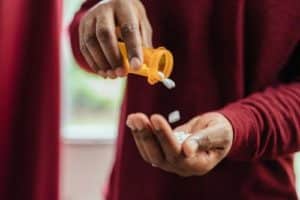
We trust our doctors implicitly and plan to follow the prescription, but tolerances can build, and your pain can come back, making you take more and more until you cannot function without them. Has addiction taken over you’ve found yourself abusing your medication? If so, you can get the help you need through a prescription drug addiction treatment program in New England.
At Chapters Recovery Center, we have the best drug abuse treatment program to help you overcome prescription drug addiction. There is no reason for you to battle through the painful withdrawal symptoms alone. We have the right outpatient treatment options that can fit within your busy schedule. If you or a loved one is struggling with addiction, call 855.626.0800 today to learn more about our prescription drug rehab center in New England.
How is Massachusetts Affected by Prescription Drug Addiction?

Prescription drugs have been known to be abused because the signs of prescription drug addiction are not as obvious as those of illicit drug abuse. There are signs that a person is abusing prescription medications, and it is harder for them to stop using.
There are two reasons that contribute to prescription drug addiction becoming more widespread: direct factors and indirect factors. Direct factors include reasons such as much access someone has to prescription drugs.
In 2019, 22.1% of U.S. adults with chronic pain used a prescription opioid in the past three months. Prescription opioid use among adults with chronic pain varied by age group, sex, educational attainment, employment status, poverty status, and health insurance coverage.
Among people aged 12 or older in 2020:
- 5.8% (or about 16.1 million people) reported misusing any prescription psychotherapeutic drug in the past 12 months.
- 1.8% (or about 5.1 million people) reported misusing prescription stimulants in the past 12 months.
- 2.2% (or about 6.2 million people) reported misusing prescription tranquilizers or sedatives in the past 12 months.
- 1.7% (or about 4.8 million people) reported misusing benzodiazepines in the past 12 months.
- 3.3% (or about 9.3 million people) reported misusing prescription pain relievers in the past 12 months.
Why Do People Abuse Prescription Drugs?
Your risk of prescription drug addiction increases the longer you take the medication. The opioid epidemic happened because doctors would continue to prescribe painkillers and other medicines without checking if the patient was forming an addiction. Prescription pain medication is supposedto be temporary, but often that is not the case.
Tolerance Buildup
Over time, your body may build up a tolerance to your prescription medication. Many people will double or triple the amount they take without consulting a doctor to feel the same effects.
Euphoric Feelings
Opioid prescription drugs are helpful for pain relief but cause an intense euphoric feeling that is highly addictive. In some cases, this can lead to abuse of harder drugs like heroin and meth.
Weight Loss
Antidepressants and other drugs can cause significant weight loss, and some people will start taking them to help them lose weight quickly.
Increased Focus and Energy
Prescription drugs for ADHD can keep you energized and extremely focused if you do not have this condition. Many college students and professionals will take these drugs to help them with their workload when they feel overwhelmed or behind in their work or studies.
Chronic Pain and Prescription Drug Abuse
Chronic pain has been directly linked with prescription drug abuse. One study showed that people who used prescription opioid medication for reasons other than physical pain – for instance, to relieve stress or help them relax – were three times more likely to become dependent on opioids or engage in non-medically using prescription drugs within the past year.
Overall, 22.1% of adults with chronic pain had used a prescription opioid in the past three months. Men and employed adults were less likely to have used a prescription opioid compared with women and not employed adults, respectively. Additionally, another study revealed that over 50% of chronic pain patients also experienced mental health disorders within a one-year time frame.
People dealing with chronic pain are at an increased risk for developing prescription drug addiction due to their need for medications, mental health issues, and hormonal changes during painful conditions.
Mental Health and Prescription Drug Abuse

The most common co-occurring disorders found in chronic pain patients are depression, anxiety, and posttraumatic stress disorder (PTSD). Both depression and PTSD directly influence the patient’s perception of pain. These conditions can lead to feelings of hopelessness, which can increase the risk of prescription drug addiction.
The risk of developing an opioid use disorder becomes increasingly likely when a person is simultaneously experiencing both depression and chronic pain at high levels because they can amplify negative emotions. If a person begins taking their medication specifically to avoid these negative emotions, it may progress to abuse and eventually become a substance use disorder (SUD).
Prescription drug addiction is a direct result of the overprescription and increasingly addictive nature of such medications. According to one survey, 52% of Americans suffering from substance abuse issues were under the influence of prescription drugs – with 11% solely addicted to prescription opioids. The National Survey on Drug Use and Health (NSDUH) found that 3 out of every four new heroin users had abused prescription painkillers prior to switching to heroin use.
What Are Common Prescription Drugs That Individuals Can Become Addicted To?
Some commonly prescribed drugs that people can become addicted to include:
- Painkillers – painkillers can relieve pain, but they also cause a high in some individuals. Individuals taking higher doses often experience an increased risk of developing an addiction.
- Stimulants – stimulants can help an individual stay awake during the daytime hours or combat feelings of sleepiness due to certain medical conditions such as narcolepsy or depression. However, if an individual takes too much or abuses these types of stimulants, they can result in side effects.
- Depressants – depressants are substances that slow down brain activity. Alcohol and sedatives are the most common types of depressants, but barbiturates and benzodiazepines can also become addictive if not used correctly.
Some of the most addictive prescription drugs available today include:
- Xanax
- Ambien
- Adderall
- OxyContin
- Ritalin
- Codeine
- Vicodin
These are also some of the hardest types of drugs to overcome because they have a similar effect on the brain as heroin. Some examples of painkiller drugs include OxyContin, Percocet, Vicodin, and Morphine. Prescription stimulant drugs are used to treat conditions such as ADHD or narcolepsy. They can be highly addictive because they speed up brain activity which creates euphoric feelings, which is why it’s vital to submit to the proper prescription.
Prescription depressants are used to treat anxiety disorders or help a person relax. They produce a calming effect by slowing down the central nervous system – which creates dependency very quickly. Examples of prescription depression medications include Xanax, Valium, and Ativan.
What Are the Signs and Symptoms of Prescription Drug Addiction?
Withdrawal symptoms occur when a person abruptly stops the use of a drug. Withdrawal symptoms for prescription drugs vary depending on the drug and dosage, as well as how long and how much was used. Symptoms can range from mild to severe.
Some common withdrawal symptoms include:
– A general feeling of discomfort or illness (called “guilt trips”)
– Mood swings
– Agitation or feeling edgy
– Anxiety, fearfulness, insecurity
– Panic attacks
– Missing pill bottles
– Time spent recovering from prescription drug addiction
– Doctor shopping (or going to different doctors and pharmacies for prescriptions)
-Increased risk-taking behavior
What Types of Treatment and Therapy are Available for Prescription Drug Addiction?

To develop an addiction, it typically takes multiple attempts for individuals to become addicted. However, there are several risk factors that can increase the likelihood of an individual becoming addicted after their first use or attempt at using these types of substances.
Risk factors may include the following:
- Individuals who have family members with drug problems are more likely to develop addictions themselves due to genetic predisposition.
- Exposure to peer pressure at any age can lead individuals to abuse prescription drugs.
- Individuals who have attempted to abuse drugs in the past are more likely to develop substance use disorders, which can include prescription drug abuse.
- Abuse of prescription medications may begin as young as age 12.
- Individuals who are addicted to illicit substances are more likely to abuse prescription medications over time because they can be obtained through friends or relatives.
- Individuals with mental health problems such as anxiety, depression, and attention deficit hyperactive disorder (ADHD) are more likely to develop an addiction to prescription medications because they do not receive the proper treatment for their conditions.
Prescription Drug Addiction Treatment Programs
Some common forms of therapy in prescription drug addiction treatment programs include:
- Individual therapy is one form of therapy, which involves one-on-one time with a therapist who works with individuals to recognize issues and concerns they may have related to their addiction.
- Group therapy, where people with similar problems meet under the guidance of a licensed counselor and group leaders, can help people understand more about their addictions and offer support from others who are at different points of recovery.
- Family therapy, which involves spouses and other family members of those suffering from prescription drug addiction, can help families understand the issues involved. It gives them a chance to discuss their concerns as well as give input on the best ways to approach and deal with the problem.
Some treatment facilities offer intervention services after an individual has decided based on what is best for him/herself and his/her situation, either voluntarily or involuntarily. Intervention services provide people with resources such as health care providers, counselors, and others who will help.
Finding the Right Prescription Drug Addiction Rehab Center in New England
To give you the best chances at breaking your prescription drug addiction, a prescription drug rehab center will include behavior therapy. This treatment can help you better understand your addiction and how it can take over your life.
Depending on your needs, your addiction treatment may consist of:
- Cognitive-behavioral therapy (CBT)
- Dialectical behavior therapy (DBT)
- Individual therapy
- Group therapy
- Family therapy
Addiction affects everyone around you. Bringing your family into your addiction treatment allows everyone to understand better addiction and how they can become a part of your support system to maintain your sobriety.
Choose Chapters Recovery Center Today
When you come into Chapters Recovery Center, our caring staff will be there to help you feel comfortable in our prescription drug rehab center. Our team will develop the best treatment program to help you get over your prescription drug addiction. We will base your treatment plan on your individual needs and the severity of the addiction.
We offer several programs to help with all forms of addiction:
- Partial hospitalization program
- Intensive outpatient program
- Outpatient program
References
https://www.cdc.gov/nchs/fastats/drug-use-therapeutic.htm
https://www.drugabuse.gov/publications/research-reports/misuse-prescription-drugs/what-scope-prescription-drug-misuse
https://www.cdc.gov/nchs/data/nhsr/nhsr162-508.pdf
https://www.mass.gov/news/opioid-related-overdose-deaths-rose-by-5-percent-in-2020

